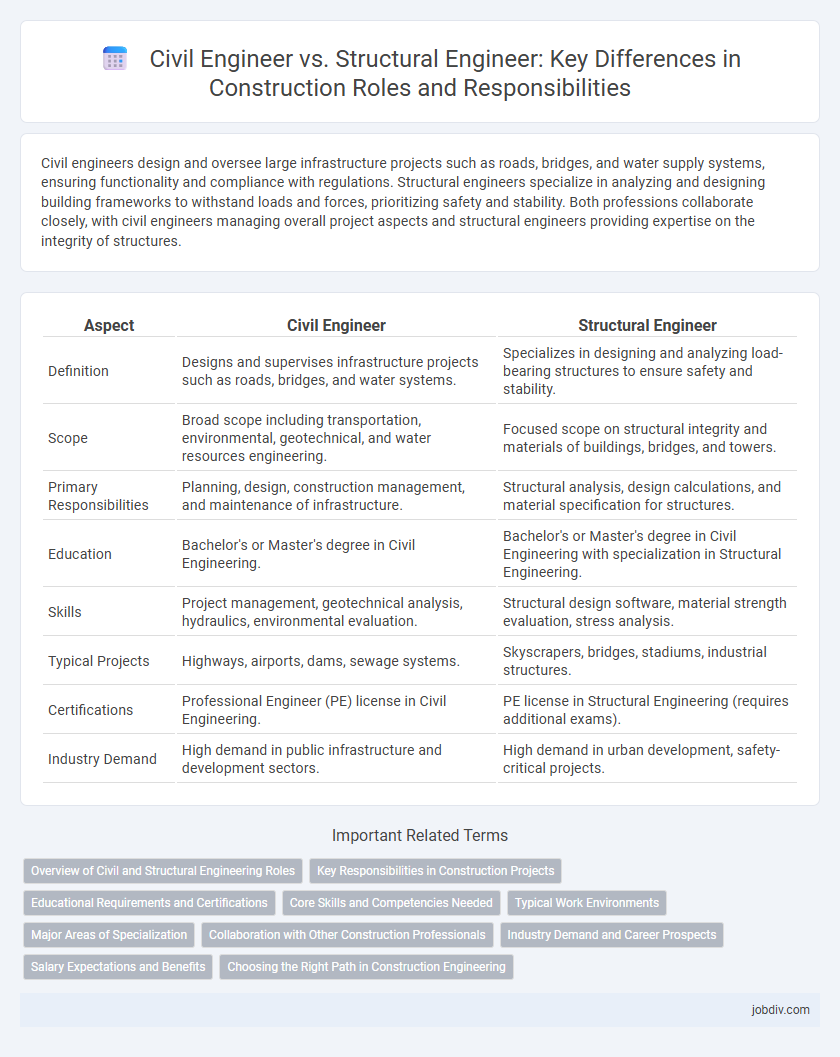Civil engineers design and oversee large infrastructure projects such as roads, bridges, and water supply systems, ensuring functionality and compliance with regulations. Structural engineers specialize in analyzing and designing building frameworks to withstand loads and forces, prioritizing safety and stability. Both professions collaborate closely, with civil engineers managing overall project aspects and structural engineers providing expertise on the integrity of structures.
Table of Comparison
| Aspect | Civil Engineer | Structural Engineer |
|---|---|---|
| Definition | Designs and supervises infrastructure projects such as roads, bridges, and water systems. | Specializes in designing and analyzing load-bearing structures to ensure safety and stability. |
| Scope | Broad scope including transportation, environmental, geotechnical, and water resources engineering. | Focused scope on structural integrity and materials of buildings, bridges, and towers. |
| Primary Responsibilities | Planning, design, construction management, and maintenance of infrastructure. | Structural analysis, design calculations, and material specification for structures. |
| Education | Bachelor's or Master's degree in Civil Engineering. | Bachelor's or Master's degree in Civil Engineering with specialization in Structural Engineering. |
| Skills | Project management, geotechnical analysis, hydraulics, environmental evaluation. | Structural design software, material strength evaluation, stress analysis. |
| Typical Projects | Highways, airports, dams, sewage systems. | Skyscrapers, bridges, stadiums, industrial structures. |
| Certifications | Professional Engineer (PE) license in Civil Engineering. | PE license in Structural Engineering (requires additional exams). |
| Industry Demand | High demand in public infrastructure and development sectors. | High demand in urban development, safety-critical projects. |
Overview of Civil and Structural Engineering Roles
Civil engineers design, plan, and supervise infrastructure projects such as roads, bridges, water supply, and sewage systems, ensuring functionality and safety in public works. Structural engineers specialize in analyzing and designing building frameworks, focusing on strength and stability to withstand loads and environmental forces. Both roles collaborate closely, with structural engineers providing detailed calculations and civil engineers managing overall project integration and compliance with regulations.
Key Responsibilities in Construction Projects
Civil engineers oversee overall site planning, infrastructure development, and project management, ensuring compliance with environmental and safety regulations. Structural engineers specialize in designing and analyzing load-bearing elements such as beams, columns, and foundations to guarantee stability and durability. Both roles collaborate closely to deliver safe, efficient, and sustainable construction projects.
Educational Requirements and Certifications
Civil engineers typically require a bachelor's degree in civil engineering and often pursue Professional Engineer (PE) certification to advance their careers. Structural engineers usually hold a degree in civil or structural engineering with specialized coursework in structural analysis and design, and they frequently obtain certifications such as SE (Structural Engineer) licensure to demonstrate expertise. Both roles demand rigorous education and certifications to ensure safety and compliance in construction projects.
Core Skills and Competencies Needed
Civil engineers require strong skills in project management, surveying, and environmental engineering to oversee infrastructure development, while structural engineers specialize in analyzing load-bearing structures, material strength, and design safety. Proficiency in software like AutoCAD, STAAD.Pro, and Revit is essential for both, with structural engineers needing advanced knowledge in finite element analysis and stress modeling. Mastery of building codes, construction standards, and problem-solving abilities is critical to ensure durability and compliance in all engineering projects.
Typical Work Environments
Civil engineers typically work on site development, infrastructure projects, and urban planning, often managing roads, bridges, and water systems in diverse outdoor environments. Structural engineers primarily operate in design offices and construction sites, focusing on analyzing and designing building frameworks and ensuring structural integrity under varying loads and conditions. Both roles require collaboration with architects, contractors, and regulatory agencies to ensure safe, efficient construction outcomes.
Major Areas of Specialization
Civil engineers specialize in infrastructure projects such as roads, bridges, water supply systems, and transportation networks, focusing on overall design, planning, and maintenance. Structural engineers concentrate on the analysis and design of load-bearing structures like buildings, towers, and dams, ensuring safety, stability, and compliance with building codes. Both disciplines require knowledge of materials, soil mechanics, and construction methods, but structural engineers emphasize detailed stress and strain calculations and structural integrity assessments.
Collaboration with Other Construction Professionals
Civil engineers and structural engineers collaborate closely with architects, contractors, and surveyors to ensure the integrity and functionality of construction projects. Civil engineers oversee site development, infrastructure, and environmental compliance, while structural engineers specialize in designing load-bearing frameworks and analyzing stress factors for safety. This multidisciplinary cooperation guarantees efficient project execution, adherence to regulations, and optimized structural performance.
Industry Demand and Career Prospects
Civil engineers have a broad scope in infrastructure projects, leading to steady demand across sectors like transportation, water systems, and urban development. Structural engineers, specializing in the integrity and safety of buildings and bridges, see high demand in high-rise construction and industrial facilities. Career prospects for civil engineers often include project management roles, while structural engineers frequently advance into design consultancy and forensic engineering positions.
Salary Expectations and Benefits
Civil engineers typically earn a median annual salary of around $88,000, while structural engineers tend to command higher pay, averaging approximately $95,000 due to their specialized expertise in designing and analyzing load-bearing structures. Benefits for both roles often include health insurance, retirement plans, and paid time off, with structural engineers frequently receiving additional incentives such as project bonuses or hazard pay for work on complex construction sites. Geographic location, years of experience, and certification levels like Professional Engineer (PE) licensure significantly impact compensation and benefits packages within both fields.
Choosing the Right Path in Construction Engineering
Civil engineers oversee broad infrastructure projects including roads, bridges, and water systems, emphasizing design, planning, and environmental impact. Structural engineers specialize in analyzing and designing building frameworks to ensure structural integrity and safety under various loads. Choosing between these paths depends on your interest in comprehensive project management versus focused expertise in structural safety and material strength analysis.
Civil Engineer vs Structural Engineer Infographic

 jobdiv.com
jobdiv.com